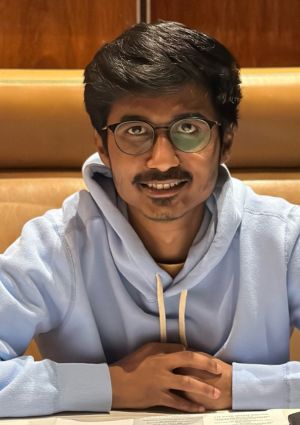In his first job out of college, as decision scientist at a data analytics firm, Abhishek Srivastava '23G learned that doctors make diagnosis and treatment decisions in essentially two ways: drawing from their clinical experience and medical knowledge and/or employing mathematical and statistical models using data.
"When I joined the company after getting my engineering degree, I got an opportunity to work in healthcare—and I liked it," says Srivastava. "I was using clinical and medical data to generate insights for physicians to make better decisions while diagnosing patients."
He felt good about the difference he was making, "but the fact that more complex algorithms were out there that I could learn, and eventually make a more significant impact in early diagnosis of patients, motivated me to do my master's in data science.'
In researching graduate schools, Srivastava was drawn to Lehigh's new MS in Data Science program, in part, because it offers courses in computer vision—an application of artificial intelligence that enables computers to draw meaningful information from digital images—and biomedical image analysis.
"Those courses are completely aligned with what I do," says Srivastava, who is now a senior data scientist at Sophia Genetics, a software company that does genomic and radiomic analysis for hospitals, labs, and biopharmaceutical companies, "and what I want to do in the future, which is to use data science for personalized care."
An interdisciplinary advantage
Data science can be applied to a wide range of domains—basically, any field that deals with data can benefit from the insights and predictions provided by data science techniques. Lehigh's MS in Data Science program is focused on training students like Srivastava to address real-world problems in a data-driven way.
The program brings together professors from computer science and engineering, electrical and computer engineering, and industrial and systems engineering to teach graduate students the fundamentals of data science from varying viewpoints.
That approach allows students from a wide range of backgrounds to gain the qualifications necessary to tap into the wealth of data science jobs, many of which require an advanced degree.
As much as Srivastava appreciated the coursework that now compliments his day to day work, he particularly liked the multidisciplinary, interdepartmental aspect of the program—and took advantage of the research opportunities that are a hallmark of the Lehigh Engineering experience.
"I worked with professors outside of my master's program," Srivastava says. "The courses helped me to gain more in depth knowledge about hardcore machine learning and statistical data science, but I was also able to work with professor Thomas McAndrew in Lehigh's College of Health."
Srivastava collaborated with McAndrew, a computational scientist with a focus on biostatistics, to use deep learning to forecast the hospitalization rates of influenza patients to inform CDC policy.
Though Srivastava just started with his new company, he's eager to apply his knowledge and skills in data science to future projects.
"Sophia Genetics is creating this data hub, which procures data from different hospitals," Srivastava says, "and I'll get to sort of own that data and organize it, with the eventual goal of enhancing precision in personalized care."

